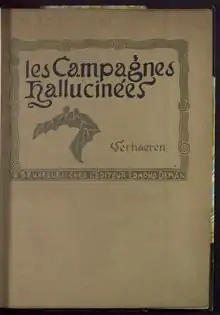Les villes tentaculaires
Les villes tentaculaires (transl. The Tentacular Towns, sometimes rendered "The Great Cities" or "The Many-Tentacled Town") is a volume of Symbolist poetry in French by the Belgian Émile Verhaeren, first published in 1895 by Edmond Deman, with a frontispiece by Théo van Rysselberghe. It established the poet's European reputation,[1][2] and his stature as "a true pioneer of Modernism".[3] The loose theme of the collection is modern urban life and the transformation of the countryside by urban sprawl.[4]
 | |
| Author | Émile Verhaeren |
|---|---|
| Original title | Les Villes tentaculaires |
| Country | Belgium |
| Language | French |
| Genre | Symbolist poetry |
| Published | 1895 |
| Publisher | Edmond Deman |
| Media type | |
Original text | Les Villes tentaculaires at French Wikisource |
The theme of urban sprawl had already been broached in Verhaeren's 1893 collection Les campagnes hallucinées ("The hallucinated fields").[5] The two collections were generally printed together in one volume from 1904 onwards.
Contents
In the 18th edition of the joint publication Les Villes tentaculaires, précédées des Campagnes hallucinées (Paris, 1920), the poems included were as follows. A few of the poems have been published in English translation by Will Stone.
- Les campagnes hallucinées

- La ville[6]
- Les plaines
- Chanson de fou
- Le donneur de mauvais conseils
- Chanson de fou
- Pèlerinage
- Chanson de fou
- Les fièvres
- Chanson de fou
- Le péché
- Chanson de fou
- Les mendiants[7]
- La kermesse
- Chanson de fou
- Le fléau
- Chanson de fou[8]
- Le départ
- La bêche
- Les villes tentaculaires
References
- David Gullentops, "La réception de Verhaeren aux Pays-Bas", Revue Belge de Philologie et d'Histoire, 77:3 (1999), pp. 739-750.
- Jan Robaey, "Verhaeren en Italie: Ambiguïtés d'une fortune littéraire", Revue Belge de Philologie et d'Histoire, 77:3 (1999), pp. 765-786.
- Émile Verhaeren, Poems, translated by Will Stone (Todmorden, Arc Publications, 2014), p. 26.
- Patrick Abercrombie, "The Many-Tentacled Town: The Vision of Emile Verhaeren", The Town Planning Review, 3:2 (1912), pp. 133-149.
- Stefan Zweig, Émile Verhaeren, translated by J. Bithell (London, Constable and co., 1914), pp. 100-106. Available through Project Gutenberg.
- Partially translated by Will Stone as "The Town (excerpt)"
- Translated by Will Stone as "The Beggars"
- Translated by Will Stone as "Madman's Song"
- Translated by Will Stone as "The Plain"
- Translated by Will Stone as "The Soul of the Town"